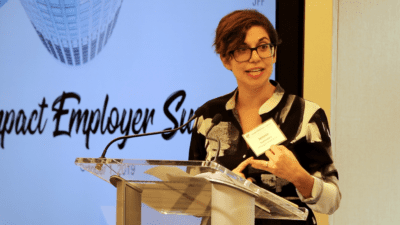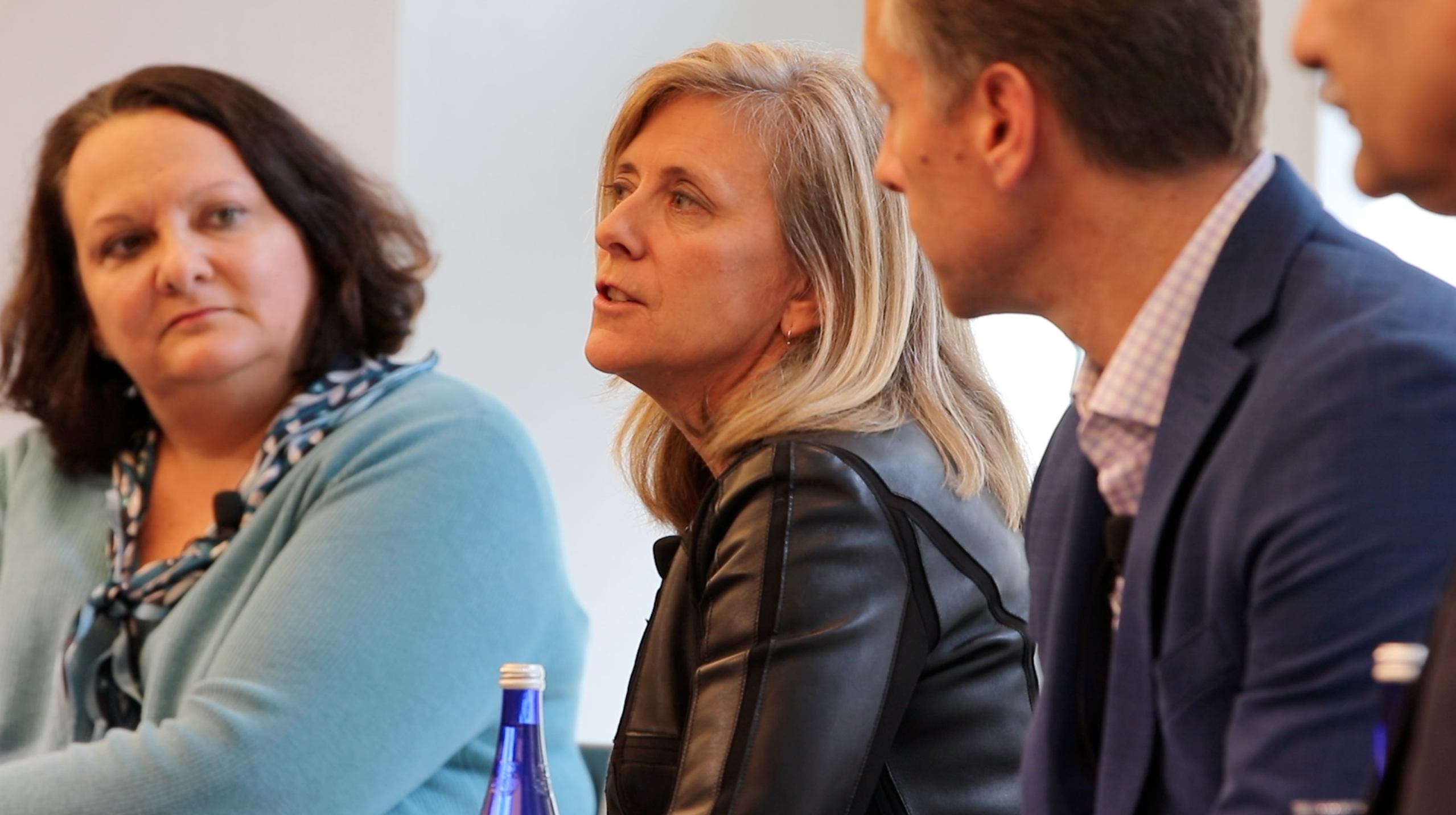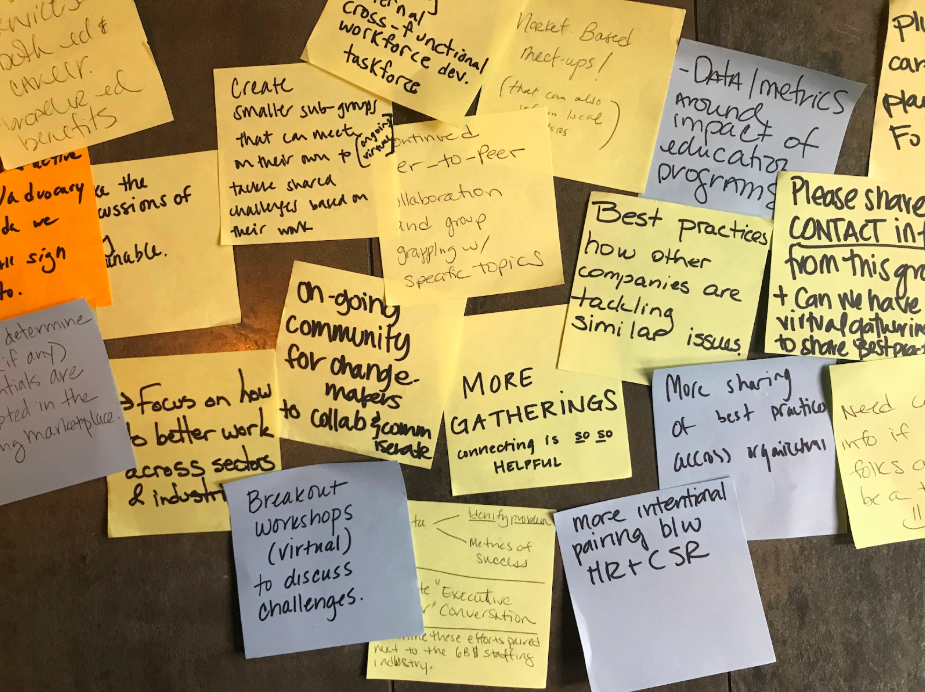
Companies Working Together Can Change the World
October 17, 2019
At JFF, we see the rapid change that’s happening in the world of work, and we’re doing something big and bold to make sure everyone has an opportunity to thrive—not just survive—in the new economy.
That’s why we’re building a community of corporate changemakers who understand that investing in the well-being of their workers is the new business imperative. We call them Impact Employers because they recognize that they have the power to make a real difference in how everyone experiences work.
It was amazing to be in the same room with folks from such diverse industries all tackling the same challenges. It’s great to feel less alone in all of this.
Claire Sands, Postmates
Earlier this month, about 40 of those changemakers met in New York City for JFF’s first Impact Employer Summit, a full-day gathering to support and mobilize this community of leaders as they dug into what works and what doesn’t—and most importantly, what they can do together. They immediately recognized that they were kindred spirits who share a sense of urgency about the changing economy and see a great deal of potential in the future of work, and were energized by the realization that they can support and inspire one another.
“It was amazing to be in the same room with folks from such diverse industries all tackling the same challenges,” said Claire Sands of Postmates. “It’s great to feel less alone in all of this—and honestly, my mind was blown that we were indeed facing such similar issues.”
Diverse Industries, Common Purpose
That diversity of industries was reflected in our summit advisory council, which was made up of event host JPMorgan Chase, plus Salesforce, Walmart, Autodesk, and AT&T.

The attendees included corporate social responsibility, human resources, and operations executives from Fortune 500 companies representing a mix of industries. Representatives of financial services firms Goldman Sachs and Capital One and software vendors Microsoft and Workday collaborated with colleagues from the likes of Wayfair, JetBlue, and Panasonic.
We heard from Alan Murray, the CEO of Fortune; Scott Pulsipher, the president of Western Governors University; Anant Agarwal, the CEO of edX; and Shannon Hobbs, the head of global talent management at JPMorgan Chase.
We were blown away by what happened when we got these leaders together in a room. We learned a lot about what they need, and we’re building our Corporate Action Platform to support them as they move forward.
Trying New Things Together
I wanted to share my top three takeaways, because they’re valuable to all of us:
- We’re early on the adoption curve, but widespread change is inevitable. Throughout the day, we discussed how greater corporate investments in worker well-being and advancement are now widely embraced as the direction leading employers must take. But those who are genuinely taking action on these issues are still in the “innovator” or “early adopter” phase. They’re trying new things, and sometimes they’re failing. They’re looking for the ideas that work, and for a network of changemakers who will support them along the way.
- Community, community, community. I knew that these leaders were craving connection to like-minded peers from other companies, but I didn’t realize how quickly this community would form. Within minutes of getting in the room together, there was a buzz and a sense of collaboration and support. As a facilitator, it was easy to spur dialogue (and, frankly, a little hard to quiet the room when we needed to refocus and move on!).
- People want to know what “good” looks like. This field is still emerging. Promising practices are out there, but they’re scattered. There’s an emerging group of changemakers who are looking for the best of what is out there, and they want to bring those ideas back to their companies. They also want to know how to measure success—key performance indicators and benchmarking are terms that resonate. We all want to know what good looks like, and to get there quickly.
Stepping Up to Be Part of the Solution
As I looked around the room at the summit, I was struck by the potential for positive impact. The companies that were there employ more than 5 million people. Five. Million. People. That is what scale looks like. That’s why it matters that companies are stepping up and engaging on issues of work and economic mobility—because they’re a critical part of the solution.

Big things can happen when inspired corporate leaders are motivated to make change and are equipped with the best practices, tools, insights, and support network they need to carry out that change.
The advice that Fortune’s Alan Murray shared with the attendees summed it up: “Recognize your power—and your ability to change the company that can change the world.”
Related Content

Corporate Action Platform
Corporate Action Platform Corporate leaders tap into JFF’s influence, resources, peer groups, and tools to learn what works, engage with changemakers, and adopt best practices that drive real return for businesses and their workers. Learn…

Impact Employer Model
Prepare your company for the future of work by putting talent first. About Impact Employers Impact Employers take a fundamentally different approach to attracting, developing, and retaining talent—they prioritize the social and economic well-being of…
